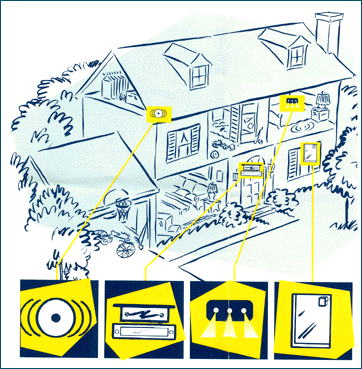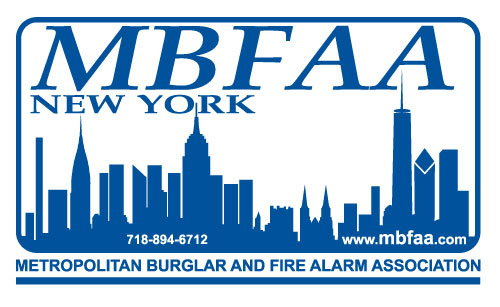 |
| |
- Chances are you ... or someone you know ... has been burglarized.
- Besides the loss of personal belongings, many victims feel they've lost control. Crime victims also report feeling defenseless and violated. Nothing feels safe anymore.
- You want a sense of security. You want to protect your home and loved ones. And whether you're relaxing in your living room, working in your office or enjoying a vacation ... you want to have peace of mind. But you don't want to give in to crime or feel trapped in your own home.
- Yes...burglary is big business in America. One burglary is committed every 10 seconds. That adds up to nearly 13 million homes - one of every 20 - with an average loss of $1,300 worth of property!
- But there are steps you can take.
Return to Top
|
 |
| |
- More and more Americans say they feel safer with a home security system. In fact, over the last 5 years, the number of homes with a security system has jumped by nearly 40%. Today, about 1 in 6 homeowners has invested in electronic protection.
Return to Top
|
 |
| |
- It's a fact - many burglars are scared off by just the presence of a security system. Burglars attack homes without electronic security 3 times more often than homes with a system.
- Maybe you're ready to invest in a home security system. But just what is a "good" system?
- A good standard system covers the entire perimeter of your home. It alerts you and lets the intruder know he's been detected. It limits damage and summons help. And it's easy to use.
- Basic elements of a standard system include: a control panel, keypads, backup battery, telephone line seizure, a digital dialer linked to a central monitoring station, a siren, inside motion detectors, and door and window contacts.
Return to Top
|
 |
Once in the house, thieves do just what you do when you come home: They head for the bedroom. That's where most of us keep our valuables. A jewelry box on top of the dresser is practically a homing signal. But, they also know your "clever" hiding places: dresser drawers, the freezer, under the mattress, the cookie jar!
They're after cash and small, easy-to-carry things they can turn into cash - quickly. Jewelry. Silver. Cameras. But taking bulky items doesn't scare these crooks off either - TVs, VCRs, stereos get their attention too. Return to Top
|
| |
|
 |
Most people don't install security systems until 2 to 4 years after they move in. Burglars know this. And, your chances of a break-in are highest right after your move.
Buying decals and lawn signs instead of a security system won't work. Experienced burglars know the difference. Contrary to popular belief, burglars don't often break in at night. Their favorite hours are 9:30 a.m. - 4 p.m. - when you're at work and your kids are at school. Burglars spend less than 1 minute trying to break in, but take about 30 - 45 minutes to choose their target. Often they'll pick a familiar neighborhood or a secluded home close to a main street. Burglars don't want to work hard to get in. Believe it or not - their favorite entrance is the door. The front door. Nearly half break-in through the first floor, 32% choose the back door and 22% of burglars enter through the first floor window. The rest break-in through a garage, basement or second floor window. Return to Top
|
| |
- The best home security system will be customized to your lifestyle. It takes into account your schedule, your kids and pets, if you have any. And whether it's jewelry, baseball cards or a wine cellar, the things you value the most will be specifically protected. You should also consider including fire detection or medical emergency devices in your system.
- The final step is for the installer to teach you and your family to properly use your system, including discussing false alarm prevention measure. Studies show user education is the best defense against false alarms.
Return to Top
|
 |
| |
Home security systems have various basic components.
They include:

| Your security professional can advise you on other home security devices available, as well as best placement in your home. A good security system will use several types of detection devices. A properly designed system means that all windows and doors are wired for intrusion plus interior detection. |
Siren
Alerts you and lets intruder know he's been detected.
Magnetic contacts
They form a circuit between a door and the door frame or a window and a sill. When the door or window is opened, it breaks the circuit and sounds the alarm.
|
 Motion detectors Motion detectors
Passive infrared, photoelectric, ultrasonic or microwave detectors sense changes in a room caused by a human presence. |
 Window Shock Senor Window Shock Senor
These devices attach to the windows and detect vibrations associated with breakage or tampering of the window. |
 Closed-circuit TV Closed-circuit TV
A private television system that lets you monitor and/or record inside or outside. |
 Foil Foil
Metallic ribbon, is attached to windows and doors. The foil breaks when entry is attempted, sounding the alarm. Foil is obsolete technology and has been supplanted by window shock senors. |
 Monitoring Monitoring
A home security system should be connected to a 24-hour central monitoring station. Emergency signals from your home are electronically transmitted to the monitoring station, which immediately summons help from police, fire, or rescue. |
 Wireless Key Fob This device can fit on your keychain and allows you to remotely arm and disarm the system. They also have a panic feature. They work inside and far as 75 feet outside the house. Wireless Key Fob This device can fit on your keychain and allows you to remotely arm and disarm the system. They also have a panic feature. They work inside and far as 75 feet outside the house. |
 Glass Break Audio Detector These devices listen for the sound & frequency of breaking glass. One device can cover several windows. Glass Break Audio Detector These devices listen for the sound & frequency of breaking glass. One device can cover several windows. |
 Smoke Detectors Smoke Detectors
Provide the earliest possible warning of fire. They should be installed throughout your home. |
 Window screens Window screens
The security system is activated if the screen is cut or the screen is removed. Your existing window screens can be wired. |
 Wired system Wired system
Uses concealed or exposed wiring to connect the home security system's components. Its main advantage is low maintainence and low operating cost once installed. |
 Wireless system Wireless system
Uses radio frequencies to connect system components. No unsightly wires, no damage to walls during installation, difficult for criminals to defeat. Must replace batteries every few years. |
 Radio Backup Your alarm system uses a standard telephone line to signal the central station. Criminals may cut the phone line to defeat the alarm system. Your security dealer can install a radio backup to maintain communications with the central station. Radio Backup Your alarm system uses a standard telephone line to signal the central station. Criminals may cut the phone line to defeat the alarm system. Your security dealer can install a radio backup to maintain communications with the central station. |
|
Return to Top
|
 |
| |
- What can you expect to pay to protect your property and family? It's a question homeowners must ask themselves. Generally, there's a security system for every budget.
- Costs vary, and it largely depends on which security features you choose, what you want to protect, and the region in which you live. Over the last 10 years prices for electronics have decreased and security features have increased. However, a professionally installed security system has labor installation costs which keep pace with the cost of living. You will get what you pay for! Keep in mind your personal security is not something you should want to trust to the lowest bidder.
- When you're ready to buy your system, you can expect a one-time installation fee. If you choose to lease your system, an installation fee may or may not be included in a monthly service fee.
Return to Top
|
 |
| |
- Your home security system can save you money. Typically, insurance companies offer between 2% and 30% discount on a homeowners' policy. Ask your insurance agent which types of systems will qualify you for the greatest savings.
Return to Top
|
 |
| |
- See MBFAA online directory for a list of member companies in your area. Members agree to maintain a high level of conduct under a Code of Ethics and render services at the highest level of quality.
MBFAA member companies have demonstrated their commitment to the security of the general public and the security industry. They are licensed and qualified to meet your security needs.
Call several companies. Ask them if their employees are trained and/or certified.
-
- Narrow the field to 3 or 4 companies. Ask for the name of the person who will call on you. Plan the appointment when all members of your household are present. When the security professional visits, ask to see company identification.
- Ask for a consultation, demonstration and a quote in writing. Ask for references.
- Do not shop for security based on price. Choose a system that provides the best protection for your family. Select a security dealer who you feel comfortable with and shares your concerns. Your life and property are too important!
Return to Top
|
 |
Keep an eye on your neighbors' houses. Ask them to watch yours. Get involved with your Neighborhood Watch group.
If you think someone is inside you home, don't go in. Call the police. If you do face a burglar, don't be a hero. Your life matters more than your property! If you choose to keep a firearm at home for protection, make sure it is kept secure (locked) when your not there. Also, be sure it is properly licensed and registered. When on vacation:
Make intruders think you're home. Park a car outside. Turn telephone ringers down. Constant ringing indicated an unoccupied house. Leave some lights on inside and out. Turn on the stereo or T.V. Cancel newspaper and other deliveries. Have a neighbor pick-up mail and empty garbage cans. Don't leave notes. Lock all doors and windows. Lock the garage door. Return to Top
|
| |
|
 |
Annual losses due to burglary in the United States: $2.85 billion --Bureau of Justice Statistics, 1994 Report
Homes without security systems are about 3 times more likely to be broken into than homes with security systems. And losses due to burglary average $400 less in residences with security systems than for residences without security systems. --Temple University study 90 percent of police chiefs believe alarms do deter burglaries --International Association of Chiefs of Police Return to Top
|
 |
| |
System Elements & options
Basic System
# of keypads
# of window/door contacts
# of motion detectors
# of sirens
Other Options
Glassbreak detectors
Radio backup to central station in event of phone line failure
Wired screens
Shock sensors
Keyfob
Remote telephone access
Smoke/fire detection
Water leak sensor
Low temperature sensor
Medical emergency
Return to Top
|
|
|





